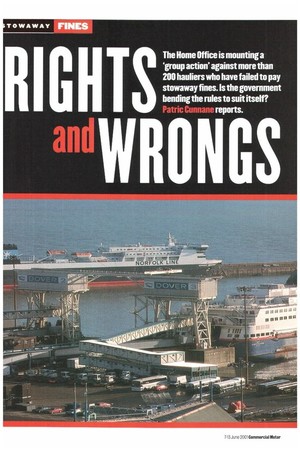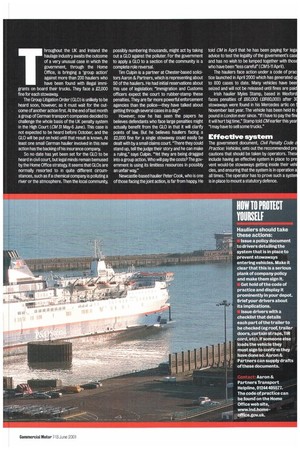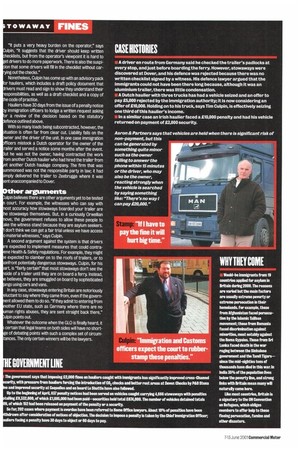"'VIII tol GS T hroughout the UK and Ireland the haulage industry
Page 42

Page 43

Page 44

If you've noticed an error in this article please click here to report it so we can fix it.
awaits the outcome of a very unusual case in which the government, through the Home Office, is bringing a group action' against more than 200 hauliers who have been found with illegal immigrants on board their trucks. They face a £2,000 fine for each stowaway.
The Group Litigation Order (GLO) is unlikely to be heard soon, however, as it must wait for the outcome of another action first. At the end of last month a group of German transport companies decided to challenge the whole basis of the UK penalty system in the High Court (CM 31 May-6 June). This case is not expected to be heard before October, and the GLO will be put on hold until that result is known. At least one small German haulier involved in this new action has the backing of his insurance company.
So no date has yet been set for the GLO to be heard in civil court, but legal minds remain bemused by the Home Office strategy. It seems that GLOs are normally resorted to in quite different circumstances, such as if a chemical company is polluting a river or the atmosphere. Then the local community, possibly numbering thousands, might act by taking out a GLO against the polluter. For the government to apply a GLO to a section of the community is a complete role reversal
Tim Culpin is a partner at Chester-based solicitors Aaron &Partners, which is representing about 50 of the hauliers. He had initial reservations about this use of legislation: -Immigration and Customs officers expect the court to rubber-stamp these penalties. They are far more powerful enforcement agencies than the poke—they have talked about getting through several cases in a day!"
However, now he has seen the papers he believes defendants who face large penalties might actually benefit from the GLO in that it will clarify points of law. But he believes hauliers facing a £2,000 fine for a single stowaway could easily be dealt with by a small claims court. "There they could stand up, tell the judge their story and he can make a ruling," says Culpin "Yet they are being dragged into a group action. Who will pay the costs? The government is using its limitless resources in possibly an unfair way.
Newcastle-based haulier Peter Cook, who is one of those facing the joint action, is far from happy. He told CM in April that he has been paying for leg advice to test the legality of the government's cas and has no wish to be lumped together with thos who have been "less careful"(CM5-11 April).
The hauliers face action under a code of prac tice launched in April 2000 which has generated u to 800 cases to date. Many vehicles have bee seized and will not be released until fines are paid
Irish haulier Myles Stamp, based in Wexford faces penalties of £60,000 (EIR80,000) after 3 stowaways were found in his Mercedes attic on November last year. The vehicle has been held in pound in London ever since. -If I have to pay the fin it will hurt big time," Stamp told CM earlier this yea "I may have to sell some trucks."
Effective system
The government document, Civil Penalty Code Practice: Vehicles, sets out the recommended pre cautions that should be taken by operators. Thes include having an effective system in place to pre vent would-be stowaways getting inside their vehi cles, and ensuring that the system is in operation all times. The operator has to prove such a syste is in place to mount a statutory defence. "It puts a very heavy burden on the operator," says ulpin, "It suggests that the driver should keep written hecklists, but from the operator's viewpoint it is hard to et drivers to do more paperwork. There is also the suspiion that some drivers will fill in the checklist without caring out the checks."
Nonetheless, Culpin has come up with an advisory pack or hauliers, which includes a draft policy document that • rivers must read and sign to show they understand their esponsibilities, as well as a draft checklist and a copy of he code of practice.
Hauliers have 30 days from the issue of a penalty notice y immigration officers to lodge a written request asking or a review of the decision based on the statutory efence outlined above.
With so many loads being subcontracted, however, the ituation is often far from clear cut. Liability falls on the wner and the driver of the unit. In one case immigration fficers mistook a Dutch operator for the owner of the railer and served a notice some months after the event. ut he was not the owner, having contracted the work rom another Dutch haulier who had hired the trailer from et another Dutch haulage company The firm that was ummonsed was not the responsible party in law; it had imply delivered the trailer to Zeebrugge where it was ent unaccompanied to Dover.
or arguments
ulpin believes there are other arguments yet to be tested court. For example, the witnesses who can say with ost accuracy how stowaways boarded your trailer are he stowaways themselves. But, in a curiously Orwellian ove, the government refuses to allow these people to ake the witness stand because they are asylum seekers. I don't think we can get a fair trial unless we have access o material witnesses," says Culpin.
A second argument against the system is that drivers re expected to implement measures that could contraene Health & Safety regulations. For example, they might e expected to clamber on to the roofs of trailers, or to onfront potentially dangerous stowaways. Culpin, for his art, is "fairly certain" that most stowaways don't see the side of a trailer until they are on board a ferry Instead, believes, they are smuggled on board by sophisticated . ngs using cars and vans.
In any case, stowaways entering Britain are notoriously luctant to say where they came from, even if the governent allowed them to do so. "If they admit to entering from other EU state, such as Germany where there are no uman rights abuses, they are sent straight back there," ulpin points out.
Whatever the outcome when the GLO is finally heard, it . certain that legal teams on both sides will have no shortgie of debating points with such a complex set of circumtances. The only certain winners will be the lawyers.




































































































